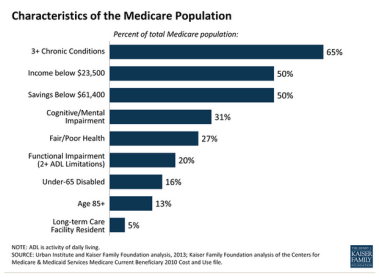Few can see past the speeches and the political battles to the doctor over there that is tending the infirm, and to the hospital that is receiving those in anguish, or feel in their heart painful wrath at the injustice which denies the miracle of healing to the old and to the poor. And fewer still have the courage to stake reputation, and position, and the effort of a lifetime upon such a cause when there are so few that share it.
But it is just such men who illuminate the life and the history of a nation.
- Lyndon B. Johnson
 In Medicare’s most recent history, a few important pieces of legislation have been passed. The first is The Medicare Improvements for Patients and Providers Act. The bill was enacted on a congressional override of President Bush’s veto. The bill largely expanded benefits, including a plan to increase payments to providers, more benefits for mental health treatments, and increased benefits for the extremely poor.
In Medicare’s most recent history, a few important pieces of legislation have been passed. The first is The Medicare Improvements for Patients and Providers Act. The bill was enacted on a congressional override of President Bush’s veto. The bill largely expanded benefits, including a plan to increase payments to providers, more benefits for mental health treatments, and increased benefits for the extremely poor.
One year later, Medicare got another push towards modernization with The Clinical Health Act of 2009. The act created the Office of the National Coordinator of Health Information Technology, designed to give incentives to providers who switched over from paper, to electronic health records (EHRs).
Most recently, and perhaps most famously, Medicare was largely expanded when the Affordable Care Act (ACA) passed. The ACA provided resources to supplement coverage gaps in Part D, expanded benefits for preventative health care, and created a plan to stabilize Medicare spending. Despite two major challenges to the ACA in the Supreme Court, the legislation remains intact.

Now that Medicare’s evolution has come full circle, let’s take a minute to appreciate some of the good things that have happened because of it. Today, Medicare covers a diverse population (see the chart to the right) of 55 million Americans, giving them access to 23 different types of preventative care. Insurance coverage for senior citizens in the US is nearly 100% According to AARP. And it’s not just providing access to health but lowering costs and decreasing hospital stays.
Findings according to a study in the Journal of the American Medical Association spanning from 1999-2013 found that older Americans on Medicare are spending less time in the hospital; they’re living longer; and the cost of a typical hospital stay has actually come down over the past 15 years – from $3,290 to $2,801 in inflation-adjusted dollars over the 15-year period for patients in the traditional Medicare program.
We think that’s something to celebrate – Happy 50th Medicare!
